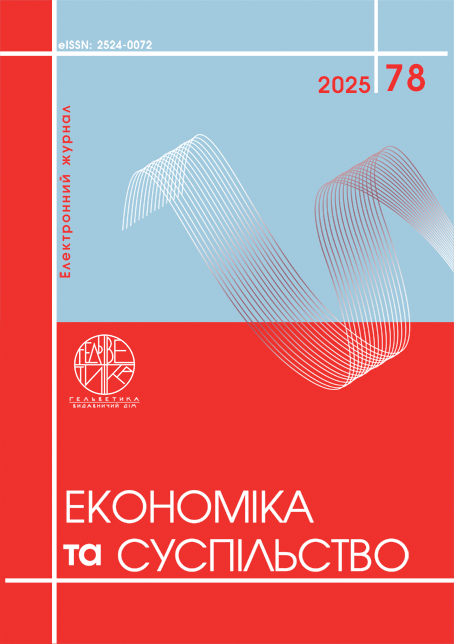COST MANAGEMENT SYSTEMS AND BUSINESS PROCESS CONTROL: HISTORICAL AND METHODOLOGICAL PRINCIPLES AND TRANSFORMATION VECTORS IN THE CONTEXT OF INDUSTRY 4.0
Abstract
The purpose of the study is to analyze cost management systems and business process control from historical and methodological perspectives and to identify key vectors of their transformation in the context of Industry 4.0. The relevance lies in combining the stability of classical accounting with the flexibility of digital platforms to adapt to national practices and real-time requirements. An evolutionary overview of the development stages of cost accounting has been carried out, from classical approaches to digital transformation and ecosystem-based management. The research methodology relies on historical-system analysis, international case studies, theoretical synthesis, and modeling of future transformations in cost management and business process control within the framework of Industry 4.0. The stages of system development and the impact of tools (IoT, Big Data, AI, digital twins, blockchain) have been identified. The international experience of companies such as Toyota (Lean/Kaizen, JIT), Siemens (digital twins), Bosch (5S, Poka-Yoke, IoT), GE (predictive maintenance), Nestlé (ERP/BI), and Amazon (robotization, ML) has been studied, which made it possible to outline adaptive strategies and approaches for different levels of technological maturity, industries, and the Ukrainian context. The results of the study have both practical and strategic significance, as they reconstruct the evolution of cost accounting systems and provide practical steps for adapting Industry 4.0 technologies to cost management, with further identification of their development vectors.
References
Wildman, J.R. (1911) Cost Accounting. New York : The Accountancy Publishing Co. 106 p.
Harrison, G.C. (1921) Cost Accounting to Aid Production: A Practical Study of Scientific Cost Accounting. New York : Engineering magazine Company. 234 p.
Paton, W.A., Littleton, A.C. (1940) An Introduction to Corporate Accounting Standards. Sarasota : American Accounting Association. 156 p.
Cooper, R., Kaplan, R.S. (1988) Measure Costs Right: Make Budgets a Strategic Tool. Boston : Harvard Business Review. 7 p.
Sánchez-Rebull, M. V., Niñerola, A., & Hernández-Lara, A. B. (2023). After 30 years, what has happened to Activity-Based Costing? A systematic literature review. SAGE Open, 13(2), 1-20. DOI: https://doi.org/10.1177/21582440231178785
Ohno, T. (1978) Toyota Production System: Beyond Large-Scale Production. New York : Productivity Press. 176 p.
Imai, M. (1986) Kaizen: The Key to Japan’s Competitive Success. New York, Columbus: McGraw-Hill Education. 260 p.
Womack, J.P., Jones, D.T. and Roos, D. (1990) The Machine that Changed the World. New York : Simon and Schuster. 352 p.
Davenport, T.H. (1998) Putting the Enterprise into the Enterprise System. Boston : Harvard Business Review. 12 p.
Schwab, K. (2016) The Fourth Industrial Revolution. London : Portfolio. 192 p.
Dai, J., & Vasarhelyi, M. (2023). Management accounting 4.0: The future of management accounting. Journal of Emerging Technologies in Accounting, 20(1), 1-13. DOI: https://doi.org/10.2308/JETA-2023-009
Nakamoto S. (2008) Bitcoin: A Peer-to-Peer Electronic Cash System. 9 p.
Tapscott D., Tapscott A. (2016) Blockchain Revolution: How the Technology Behind Bitcoin Is Changing Money, Business, and the World. New York: Penguin. 384 p.
Parker G., Van Alstyne M. and Choudary S. (2016) Platform Revolution: How Networked Markets Are Transforming the Economy. New York : Norton & Company. 352 p.
Asadi, S. K. M. (2025). Digital transformation and blockchain technology: A new horizon for cost and managerial accounting. European Journal of Accounting, Auditing and Finance Research, 13(8), 31-39. DOI: https://doi.org/10.37745/ejaafr.2013/vol13n8-3139
Waweru, N. M. (2010). The origin and evolution of management accounting: A review of the theoretical framework. Problems and Perspectives in Management, 8(3), 165-182.
Soori, M., & Ahmadi, M. (2023). Internet of things for smart factories in Industry 4.0: A review. Internet of Things and Cyber-Physical Systems. DOI: https://doi.org/10.1016/j.iotcps.2023.04.006
Sanakal, A. P. (2025). Internet of Things (IoT) in cost accounting for manufacturing industries. International Research Journal of Modernization in Engineering Technology and Science, 7(2). DOI: https://doi.org/10.56726/IRJMETS67476
Darwish, N. Y. A., et al. (2025). Big data revolution: Enhancing financial planning and budgeting strategies. International Journal of Multidisciplinary Applied Business and Education Research, 6(3), 1044-1055. DOI: https://doi.org/10.11594/ijmaber.06.03.06
Sanakal, A. P. (2024). Artificial intelligence and machine learning in product cost planning for manufacturing industries. International Research Journal of Modernization in Engineering Technology and Science, 6(10). DOI: https://doi.org/10.56726/IRJMETS62688
Shamim, M. M. I., et al. (2023). Advancement of artificial intelligence in cost estimation for project management success: A systematic review. Modelling, 6(2), 35. DOI: https://doi.org/10.3390/modelling6020035
Fantozzi, I. C., et al. (2025). Digital twins: Strategic guide to utilize digital twins to improve operational efficiency in Industry 4.0. Future Internet, 17(1), 41. DOI: https://doi.org/10.3390/fi17010041
Panisi, F. (2017). Blockchain and «smart contracts»: FinTech innovations to reduce the costs of trust. SSRN Electronic Journal. DOI: https://doi.org/10.2139/ssrn.3066543
Roumeliotis, C., et al. (2024). Blockchain and digital twins in smart Industry 4.0: The use case of supply chain. Designs, 8(6), 105. DOI: https://doi.org/10.3390/designs8060105
Kulkarni, S. A., Nagare, R. R., Nagare, D. N., & Aware, P. N. (2021). Toyota Production System - Maximizing production efficiency by waste elimination. International Advanced Research Journal in Science, Engineering and Technology, 8(4). DOI: https://doi.org/10.17148/IARJSET.2021.8448
Annanth, V. K., Abinash, M., & Bhaskara Rao, L. (2021). Intelligent manufacturing in the context of industry 4.0: A case study of Siemens industry. Journal of Physics: Conference Series, 1969(1), 012019. DOI: https://doi.org/10.1088/1742-6596/1969/1/012019
Salgado, P., & Varela, L. (2010). Kanban sharing and optimization in Bosch Production System. Proceedings of KMIS 2010, 81-91. DOI: https://doi.org/10.5220/0003102600810091
Naiya, S. (2025). AI-powered predictive maintenance in IoT-enabled smart factories. Research Annals of Industrial and Systems Engineering, 2(1), 27-35. DOI: https://doi.org/10.22105/SA.2021.281500.1061
Büchel, B. і Zintel, C. (2024) «Nestlé Continuous Excellence: Lessons for driving performance improvement». European Financial Review. Available at: https://www.europeanfinancialreview.com/nestle-continuous-excellence-lessons-for-driving-performance-improvement
Alalade, E. O. (2025). Digital transformation and supply chain efficiency: A case of Amazon Inc. International Journal of Research and Innovation in Social Science, 3(1), 3931-3944. DOI: https://doi.org/10.47772/IJRISS.2024.8120326

This work is licensed under a Creative Commons Attribution 4.0 International License.


